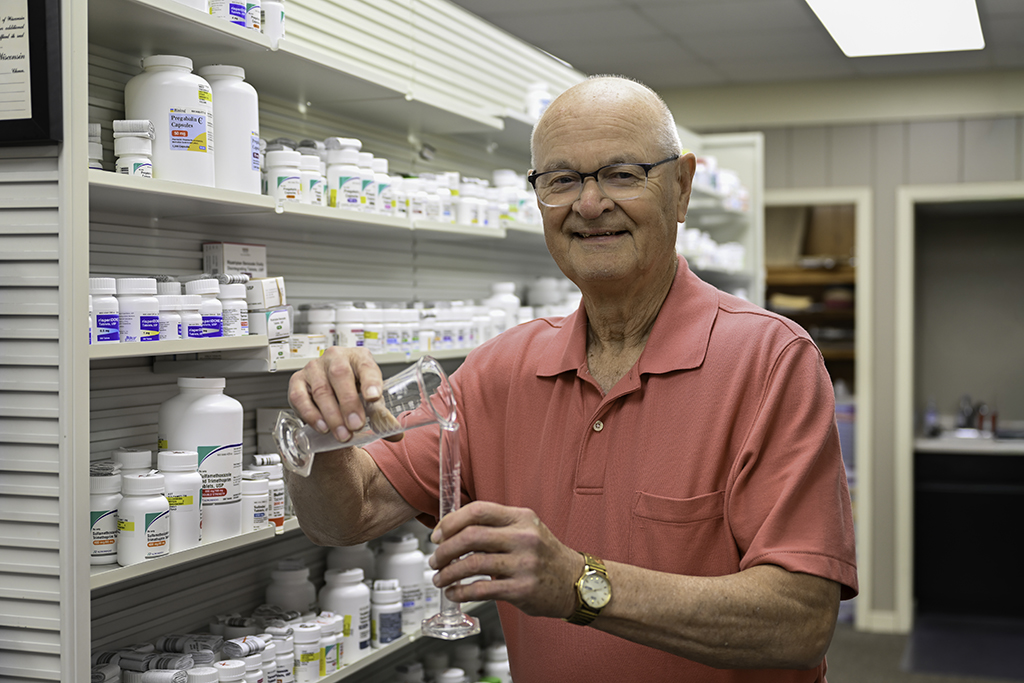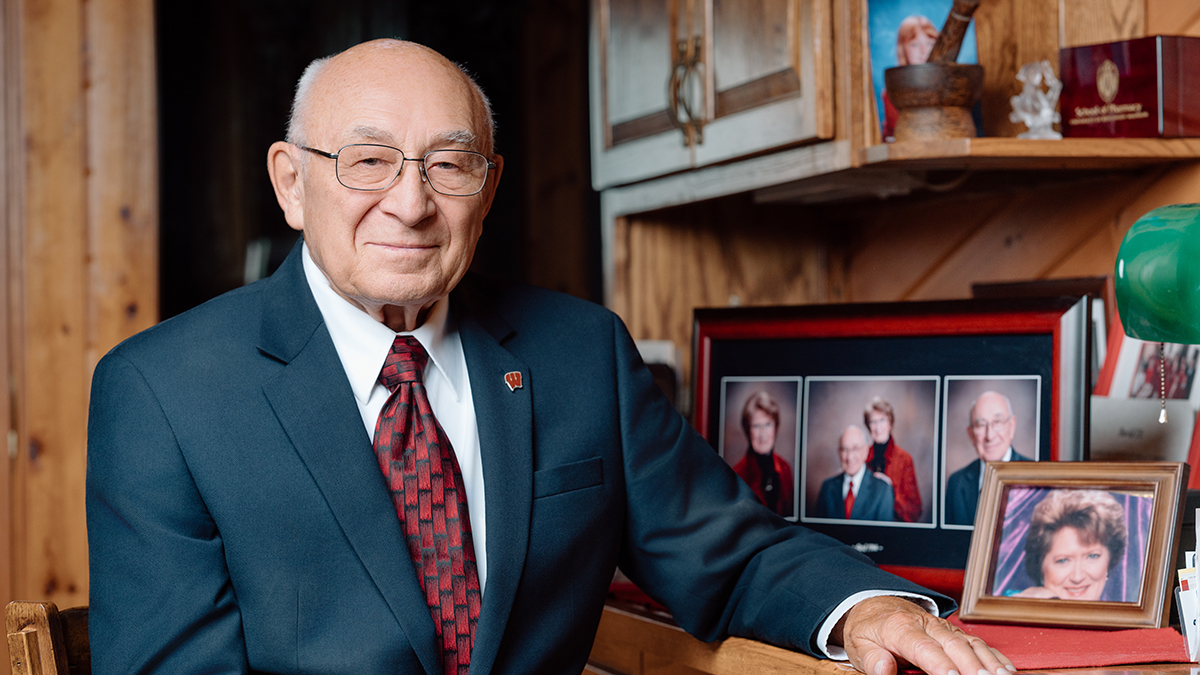
From pioneering practice models to guiding generations of leaders, alum David Zilz’s (BS ’62, MS ’64) influence on pharmacy continues to ripple outward
By Katie Ginder-Vogel
It’s hard to come across a leader in pharmacy who doesn’t know David “DZ” Zilz (BS ’62, MS ’64) — a national leader whose steady vision helped define the practice of health-system pharmacy. For more than six decades, he’s been an innovator re-thinking the delivery of care and a quintessential mentor, helping up-and-comers to realize their potential, mid-career practitioners break through to leadership, and late-career colleagues find trusted advice.
Zilz’s impact on the profession is tangible, from national professional standards, to a practice model positioning pharmacists as accountable members of the care team, to the hundreds of pharmacists across generations who consider him their mentor and continue to perpetuate his lessons to their own mentees. To those who know him best, his influence has been nothing short of transformative.
“If you don’t have a mentor, get one. What I really mean is — you need a Dave Zilz in your life.”
–Bruce Scott
As former mentee Bruce Scott puts it, “If you don’t have a mentor, get one. What I really mean is — you need a Dave Zilz in your life.”
Trailblazing at UW–Madison
Zilz has been breaking the mold since he earned his pharmacy degree from the University of Wisconsin–Madison School of Pharmacy and became the first student in its joint master’s degree and residency program in Health System Pharmacy Administration and Leadership (HSPAL), offered in conjunction with UW Health. At the time, nothing like it existed.
“There were no precedents when I went into the joint MS/residency program,” Zilz says. “The coursework fit in to create a degree, as well as residency — everything was an experiment.”
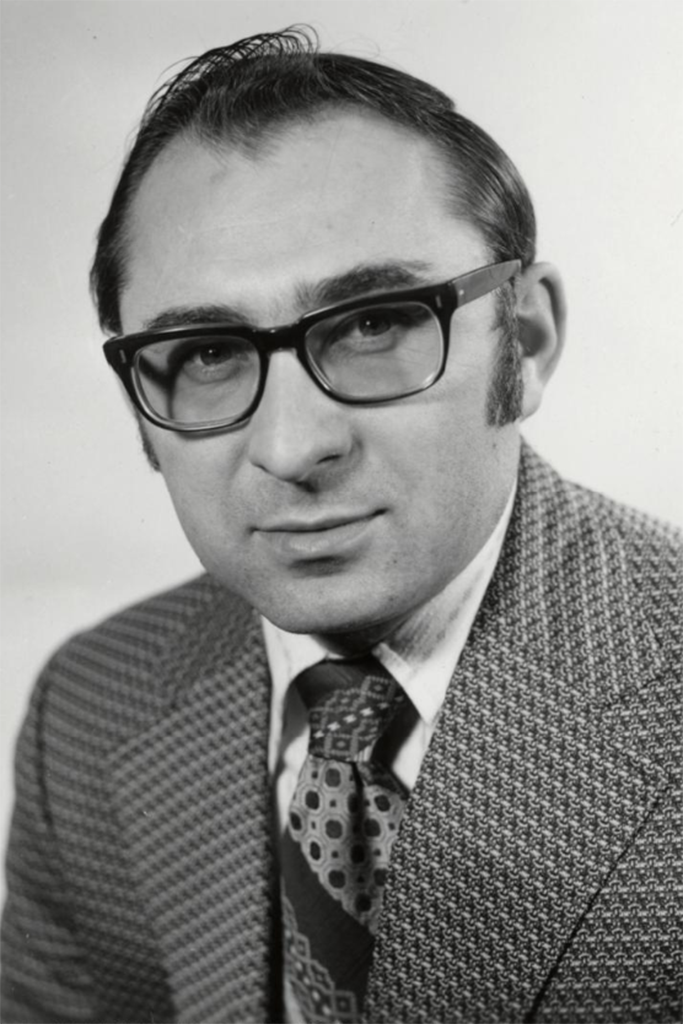
That experiment was ultimately successful: The program is now 61 years old and is one of the most respected HSPAL programs in the nation.
With the unwavering support of his wife, MaryAnn — who he says was with him every step of the way, from their 1966 wedding until her passing in 2024 — Zilz began his career in leadership. He presided over UW Health’s HSPAL program for more than a decade as the director of UW Health’s Pharmacy Services from 1972 to 1983, building a practice model built on collaboration, accountability, and continuity of care with colleagues Tom Thielke (BS ’67, MS ’69) and Pam Ploetz (BS ’68).
“UW was a leader, and still is, in what I would call the comprehensive practice model,” Zilz says. “I supported collaborative continuity and all-encompassing accountability whenever medications are used.”
Beyond pharmacy, Zilz also led UW Health’s Central Services, Materials Management, and Respiratory Care. He collaborated with colleagues to establish home care and infusion services, a technology identification and assessment team, and the Office of Clinical Research at the UW School of Medicine and Public Health.
A legacy of service and leadership
Zilz’s influence quickly transcended UW Health. In 1972, he was named one of the Outstanding Young Men of America, an annual biographical compilation created by men’s civic organizations, for his professional success and contributions to community and professional organizations.
He went on to serve as president of the American Society of Health-System Pharmacists (ASHP) from 1980 to 1981 and served on the board as treasurer for six years.
“In 1980, ASHP created the first credentialing process for clinical and specialty pharmacists, which was a big deal,” Zilz says. “In 1981, ASHP set the minimum standard for ambulatory care, and those things were pivotal in transforming ASHP’s visibility during my presidential term.”
In 1990, ASHP awarded Zilz health-system pharmacy’s highest honor: the Harvey AK Whitney Lecture Award. In 2002, Zilz received the ASHP Distinguished Leadership Award, and in 2013, he was featured in an ASHP Foundation video series about health system pharmacy’s most influential leaders.
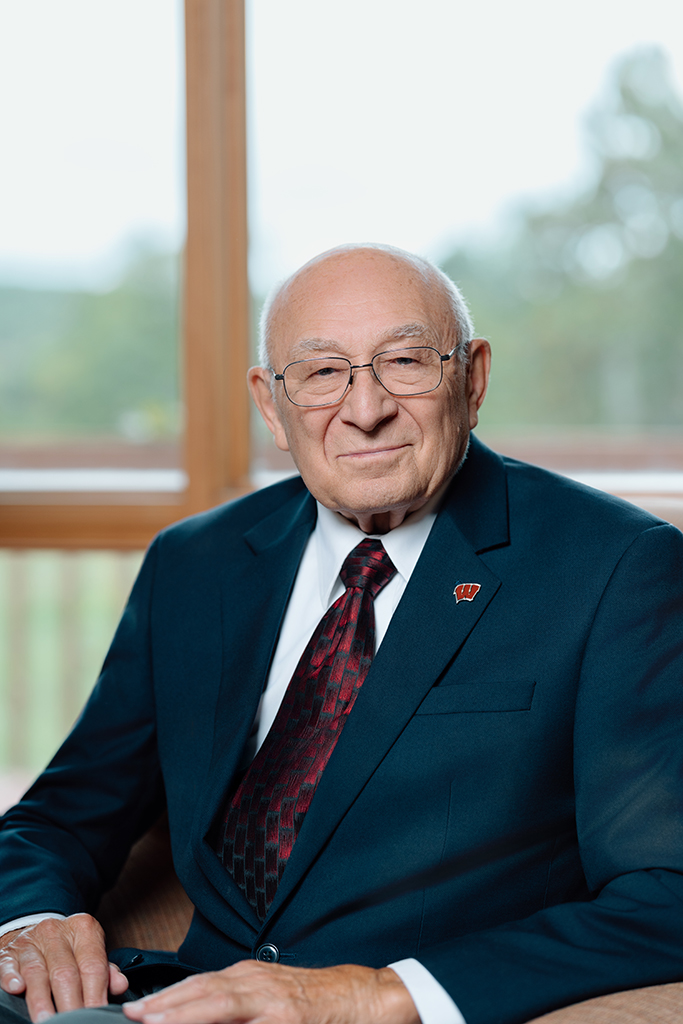
The Vizient, Inc Consortium Pharmacy Network even created the David Zilz Leadership Award to honor his career. His mentee and collaborator Marianne Ivey (BS ’67) is one recipient of that award.
“Dave Zilz has been my sponsor and advocate for as long as I can remember,” Ivey says. “I benefited from the infectiousness of his passion for the profession of hospital pharmacy, his boundless energy, and his relentlessly positive nature.”
Ivey followed Zilz consecutively as president of ASHP and initiated a fundraising campaign at the ASHP Foundation to honor Zilz’s leadership and mentorship.
“The fund has been very successful, leading to an annual forecast report and other leadership activities sponsored by ASHP,” Ivey says.
Closer to home, Zilz was honored as Pharmacist of the Year by the Wisconsin Society of Hospital Pharmacists, which is now the Pharmacy Society of Wisconsin. Throughout his laudable career, he’s maintained close ties with the UW–Madison School of Pharmacy, mentoring its students and serving on the School’s Board of Visitors, including a term as chair. His sustained commitment to the School and its students was honored with a Citation of Merit from the School in 1998, as well as the Alumnus of the Year Award from the Pharmacy Alumni Association in 2016.
“I felt my value on the Board of Visitors was in asking the questions about trends in pharmacy and where they fit in education, from my perspective with pharmacy associations and my residency network,” Zilz says.
Zilz encouraged his mentee Bruce Scott (BS ’79) to join the Board of Visitors, and Scott also followed Zilz’s footsteps in serving as ASHP president and receiving the field’s highest recognition.
“Dave’s mentorship has positively influenced every aspect of my life. Over the years, our conversations have covered various aspects of my life plan, numerous career situations and decisions, and important issues impacting the pharmacy profession,” says Scott. “There is no doubt in my mind that he played a hand in any career success I have enjoyed and made me a better person in the process, and I am not the only one to benefit from his mentorship — I believe he has touched thousands.”
Enduring mentorship
In addition to Scott and Ivey, Zilz has mentored countless pharmacy leaders at UW Health and the School of Pharmacy, and beyond, even traveling to different hospitals and VAs across the country to speak with pharmacy residents and help them build their life plan.
“UW residents and their career path are pretty influential in the social impact of their roles,” Zilz says. “That’s been reinforced as I’ve met with them over the years, and that’s what drives me.”
“I benefited from the infectiousness of his passion for the profession of hospital pharmacy, his boundless energy, and his relentlessly positive nature.”
–Marianne Ivey
Zilz encourages his mentees to think about the legacy they want to leave, using guiding questions that are less about the answers and more about planting seeds of reflection that allow change to blossom: What kind of work gives you joy and meaning? How intentional are you in building and sustaining relationships? How will you spend your discretionary time, and will it renew or drain you? What kind of legacy do you want to leave, and are you willing to stretch beyond your comfort zone to shape it? He encourages them to review their responses to these questions routinely to track how their feelings develop or change over time.
Another framework for thinking that Zilz encourages when mentoring is what he calls “3, 2, 1 + 1”: three priorities in the next two to three months, two areas of influence in the next six months, one issue that could affect your role in one year, and one big-picture question to explore with your network.
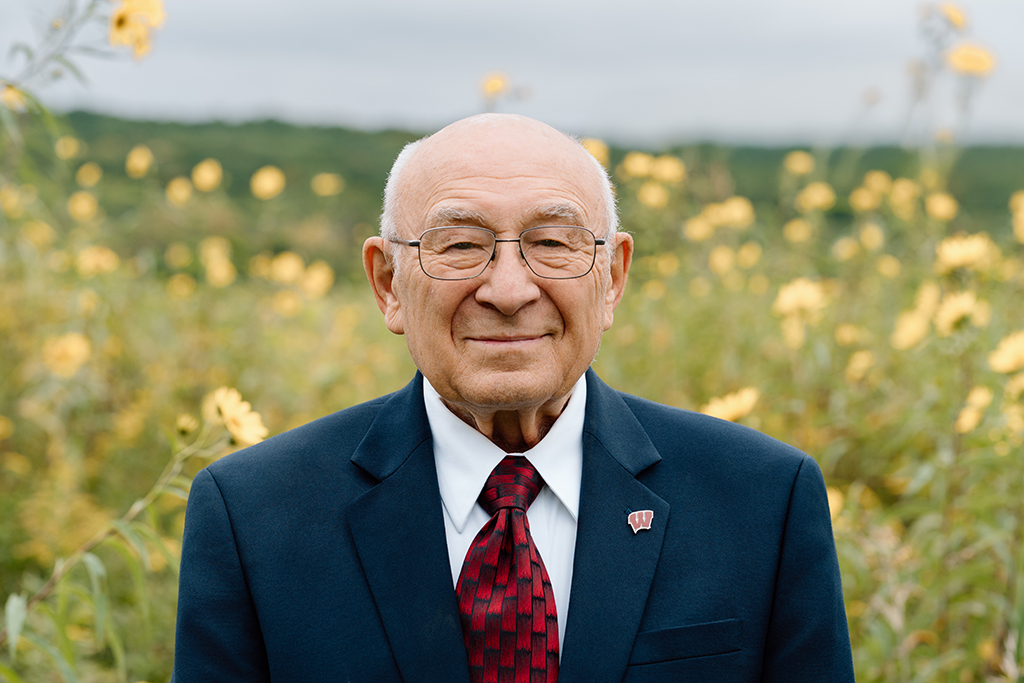
Today, he still mentors residents in a joint HSPAL residency and master’s degree program, extending a more than 60-year tradition of shaping generations of pharmacy leaders. His influence is exponential, inspiring not only his immediate mentees, but also the thousands of practitioners who have been shaped by those mentees across the profession.
“DZ’s mentorship has been a highlight of being involved with the UW Health HSPAL residency program,” says HSPAL resident Savannah Anderson. “He is dedicated to sharing his experiences as an influential pharmacy leader with the next generation of future leaders, and I am grateful I have had the opportunity to learn from him and get to know him.”
“Throughout residency, DZ has been a fantastic mentor and resource to help me talk through some of the challenges I am facing and how best to grow from each experience,” says HSPAL resident Eric Doyle. “Having a mentor such as DZ is a great opportunity for new leaders like me to tap into a wealth of knowledge on different challenges within pharmacy.”
Staying involved
Although Zilz describes himself as semi-retired, he continues to lecture, mentor, and coach, and drive 22-wheelers, as he has for the past 15 years. His other eclectic retirement activities have included climbing the Grand Canyon three times, elk hunting in the Montana wilderness, working for a farmer for three summers, and running a chainsaw for a logging operation.
He has also been involved in his church and served on the boards of both his local nursing home and Oakwood Village in Madison.
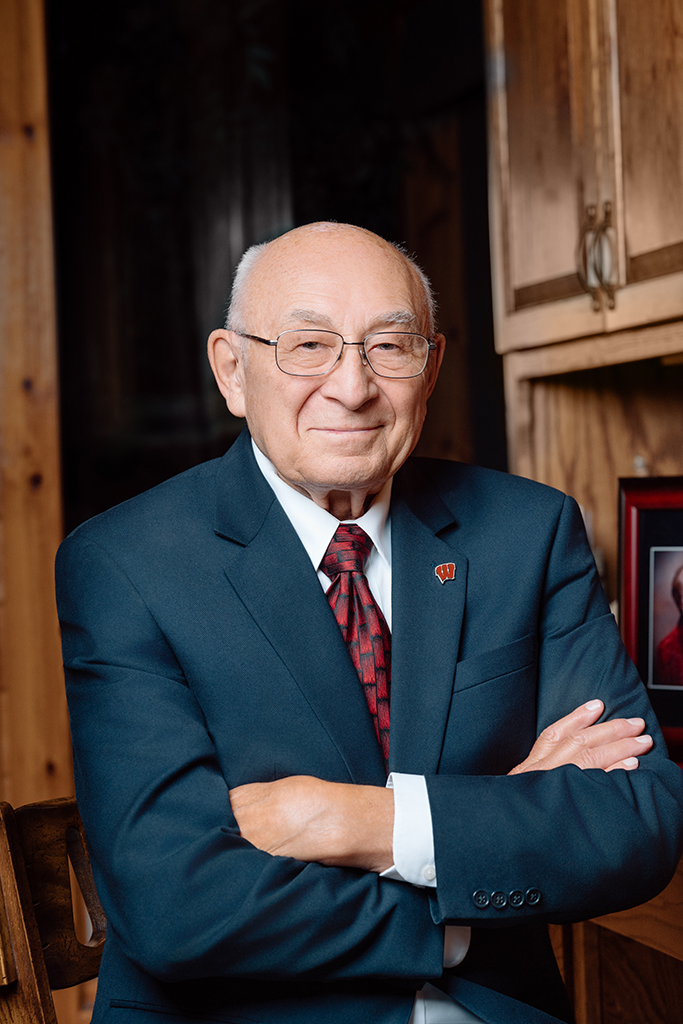
“As it expanded, I got a sense of what the future looked like for nursing home needs,” Zilz says. “That whole campus was just one building when I was on the board, and we were involved in the process of designing and building the larger facility.”
He also stays plugged into his professional network, including speaking with Ivey and Agatha Nolan, his co-authors on an upcoming book about spirituality and pharmacy practice, as well as a group of past presidents of ASHP.
“Our agenda is that we can talk about anything, as long as it’s not pharmacy, unless it’s a good rumor,” he says.
Zilz says he’s driven by the idea that he can provide value in almost any setting by asking questions related to his experience that haven’t yet been asked.
“That’s what my experience brings to the table,” he says. “What is the unasked question?”
Looking toward the future of the profession, Zilz predicts that by 2030, capacity and practitioner shortages in facilities will create bottlenecks in acute care.
“The throughput for acute care will have to be managed differently, with the medication management system as a key component of accelerating that throughput,” he says. “That’s what I view as the UW’s comprehensive, total accountability model, and I believe it is positioned better than people realize.”
Without a doubt, Zilz will be there to chronicle the process, raise new questions, and guide his mentees, because for them, Zilz’s legacy is just the beginning.
